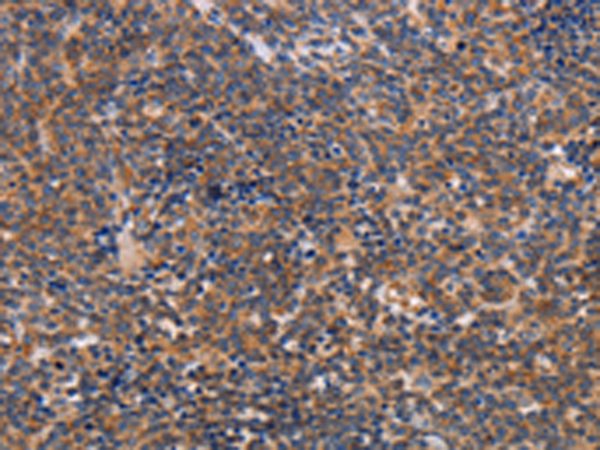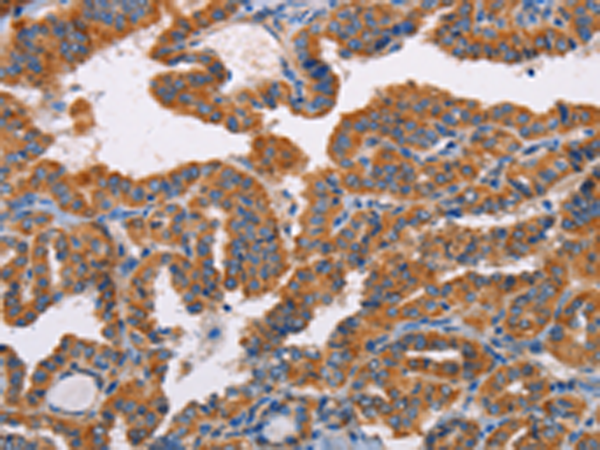

| WB | 咨询技术 | Human,Mouse,Rat |
| IF | 咨询技术 | Human,Mouse,Rat |
| IHC | 1/50-1/200 | Human,Mouse,Rat |
| ICC | 技术咨询 | Human,Mouse,Rat |
| FCM | 咨询技术 | Human,Mouse,Rat |
| Elisa | 1/2000-1/5000 | Human,Mouse,Rat |
| Aliases | CDG1L; DIBD1; LOH11CR1J |
| Host/Isotype | Rabbit IgG |
| Antibody Type | Primary antibody |
| Storage | Store at 4°C short term. Aliquot and store at -20°C long term. Avoid freeze/thaw cycles. |
| Species Reactivity | Human, Mouse |
| Immunogen | Fusion protein of human ALG9 |
| Formulation | Purified antibody in PBS with 0.05% sodium azide and 50% glycerol. |
+ +
以下是关于ALG9抗体的3篇参考文献,涵盖其功能、疾病关联及实验应用:
---
1. **文献名称**: *ALG9 Mutation Carriers Develop Kidney and Liver Disease Leading to Perinatal Lethality*
**作者**: Frank CG et al.
**摘要**: 研究揭示了ALG9基因突变与先天性糖基化障碍(CDG)的关联,通过抗体检测发现患者肝脏和肾脏中ALG9蛋白表达异常,导致多器官衰竭及围产期死亡。
---
2. **文献名称**: *The role of Alg9 in yeast glycosylation and its human homolog in disease*
**作者**: Thamopoulos NG et al.
**摘要**: 利用ALG9抗体进行酵母模型和人细胞实验,证明ALG9在N-糖基化早期步骤中的作用,其功能缺陷导致糖蛋白合成异常,可能与代谢疾病相关。
---
3. **文献名称**: *ALG9 as a novel biomarker in breast cancer progression*
**作者**: Nguyen T et al.
**摘要**: 通过ALG9抗体免疫组化分析,发现ALG9在乳腺癌组织中高表达,其水平与肿瘤转移正相关,提示其作为预后标志物的潜力。
---
**备注**:部分早期研究可能未明确使用ALG9抗体,建议通过PubMed或Google Scholar以“ALG9 antibody”为关键词检索近年文献,获取更直接的技术应用案例。
The ALG9 antibody targets the ALG9 protein, a key enzyme in N-linked glycosylation—a critical post-translational modification process. ALG9. an α-1.2-mannosyltransferase, catalyzes the addition of mannose residues to the lipid-linked oligosaccharide (LLO) precursor in the endoplasmic reticulum (ER). This precursor is essential for proper protein folding, quality control, and cellular trafficking. Dysregulation of ALG9 disrupts glycosylation, leading to impaired protein function and cellular communication.
Mutations in the ALG9 gene are associated with congenital disorders of glycosylation (CDG), specifically ALG9-CDG (CDG-IL), characterized by multisystem abnormalities, developmental delays, and neurological deficits. ALG9 antibodies are vital tools for studying these pathologies, enabling detection of protein expression, localization, and glycosylation efficiency in models ranging from cell cultures to patient-derived samples. Researchers employ techniques like Western blotting, immunofluorescence, and immunohistochemistry to explore ALG9's role in diseases, including metabolic syndromes and cancer, where aberrant glycosylation is implicated in progression and metastasis.
Additionally, ALG9 antibodies aid in elucidating ER stress responses and autophagy mechanisms linked to glycosylation defects. Their application extends to diagnostic research, helping correlate genetic mutations with clinical phenotypes. By advancing understanding of ALG9's biological and pathological functions, these antibodies contribute to therapeutic development for glycosylation-related disorders.
×